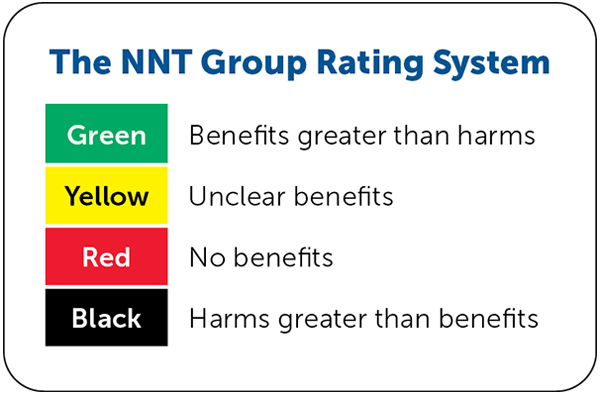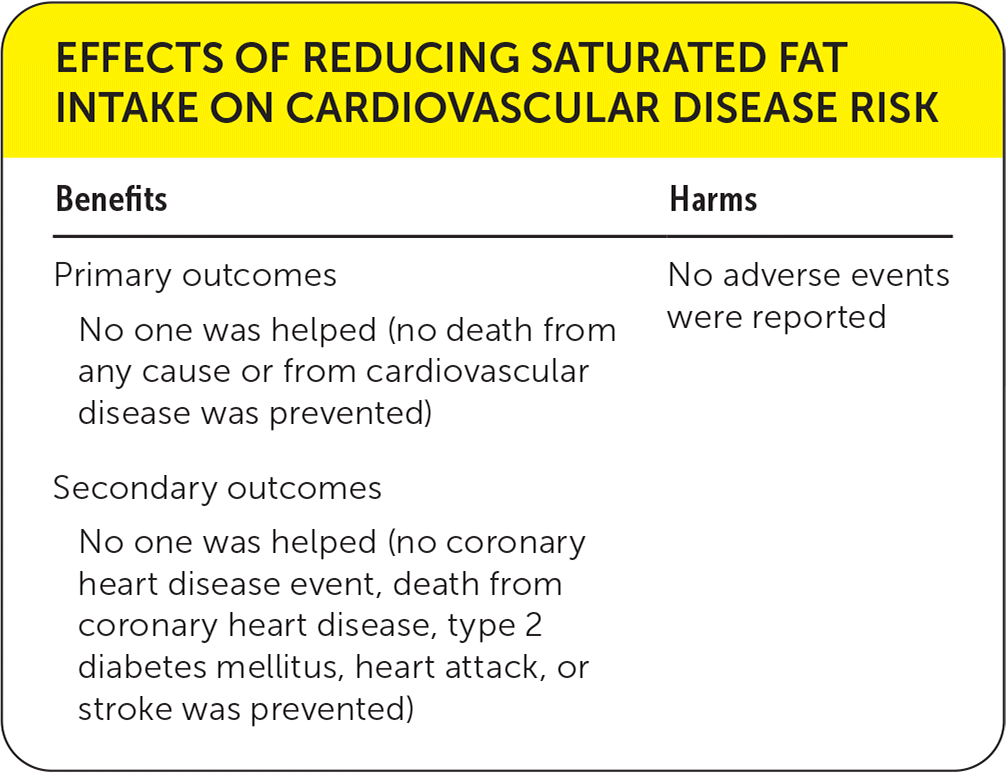
Am Fam Physician. 2022;105(1):online
Author disclosure: No relevant financial relationships.

Details for This Review

| Benefits | Harms |
|---|---|
| Primary outcomes | No adverse events were reported |
| No one was helped (no death from any cause or from cardiovascular disease was prevented) | |
| Secondary outcomes | |
| No one was helped (no coronary heart disease event, death from coronary heart disease, type 2 diabetes mellitus, heart attack, or stroke was prevented) |
Study Population: Randomized controlled trials of adults (no upper age limit or gender limitations) at any risk of cardiovascular disease (CVD) who were taking or not taking lipid-lowering medications; participants who were acutely ill, pregnant, or breastfeeding were excluded
Efficacy End Points: All-cause mortality, cardiovascular mortality (from myocardial infarction, stroke, or sudden cardiac death), combined cardiovascular events (cardiovascular death, cardiovascular morbidity [nonfatal myocardial infarction, angina, stroke, heart failure, peripheral vascular events, atrial fibrillation], and unplanned cardiovascular interventions); secondary outcomes included myocardial infarctions, stroke, coronary heart disease mortality, coronary heart disease events (myocardial infarction, angina, or sudden cardiac death), type 2 diabetes mellitus incidence, serum lipids and insulin sensitivity, cancer diagnoses and death, weight and body mass index, blood pressure, and quality of life (any measure)
Harm End Points: Cancer diagnoses, cancer deaths, quality of life (any measure)
Narrative: The American Heart Association's 2013 guideline on lifestyle management to reduce cardiovascular risk recommends that adults consume a diet with no more than 5% to 6% of calories from saturated fat.1 The Scientific Report of the 2020 Dietary Guidelines Advisory Committee recommended that adults obtain less than 10% of daily calories from saturated fatty acids (SFA) and, when possible, replace those calories with monounsaturated fatty acids or polyunsaturated fatty acids.2 This guidance is based on disease-oriented evidence that reducing SFA intake decreases serum lipids, which has been used as a surrogate marker for CVD.1
The World Health Organization (WHO) Nutrition Guidance Expert Advisory Group requested a more accurate assessment of the effects of reduced intake of saturated fats on all-cause mortality, cardiovascular morbidity, and other health outcomes. The group also requested further study of the differential effects on health outcomes when saturated fats are replaced with other fats, carbohydrates, or proteins.3
This Cochrane review assessed the effect of reduced SFA intake and replacement with carbohydrates, polyunsaturated or monounsaturated fat, and/or protein on mortality and cardiovascular morbidity, using all available randomized controlled trials. All studies were conducted in industrialized countries and were published between 1965 and 2006. All trials aimed to reduce SFA intake or demonstrated evidence of reduced SFA intake.
The authors analyzed 15 randomized controlled trials (four that are ongoing and one with published data that the study author has not analyzed). The Cochrane review included approximately 59,000 participants. Included trials reported mortality and cardiovascular data and: (1) were randomized, (2) were intended to reduce SFA intake or intended to alter dietary fat intake to achieve a reduction in SFA intake, (3) compared reduced SFA intake with higher SFA intake or usual diet, (4) were not multifactorial, and (5) were at least 24 months in length. Dietary interventions included participants receiving prepared food items, advice on how to alter SFA intake, or dietary advice and supplementation.
The Cochrane review found that reducing intake of SFA did not affect all-cause mortality or cardiovascular mortality. Reduced SFA intake also had no effect on nonfatal myocardial infarction or coronary heart disease mortality. There were no differences between men and women, and there were no reported harms with reduced SFA intake.
An analysis of 11 trials with 53,500 participants, of whom 8% had a cardiovascular event, suggested that based on moderate-quality evidence, reducing dietary SFA reduces the risk of combined cardiovascular events (relative risk reduction = 20.2%; absolute risk reduction = 17 fewer cardiovascular events per 1,000 people). A total of 59 patients without known CVD needed to be treated with a low SFA diet over four years to prevent one cardiovascular event. Meta-regression suggested that greater reductions in SFA intake resulted in greater reductions in the risk of cardiovascular events. Subgroup analysis revealed no significant difference when replacing SFA with polyunsaturated fatty acids or carbohydrates. Data on replacement with monosaturated fatty acids and protein were limited.
Caveats: This Cochrane review updated a previous review published in 2015; however, no new trials were included. The authors found new data for two included trials. The review's results, GRADE (grading of recommendations, assessment, development, and evaluation), and conclusions were updated; however, conclusions did not change.3,4 The authors concluded that new data were lacking because well-powered trials on cardiovascular endpoints need high numbers of participants over many years, which is expensive. Researchers and funders may also feel that data are already well-established.3
The authors considered trials to have a low risk of bias when randomization, allocation concealment, and blinding were determined to be adequate. Allocation and concealment were considered well-done in eight trials, and blinding of outcome assessors was adequate in nine trials. Blinding of participants was difficult and considered adequate only in one trial in which food was provided in an institutional setting. For the trials evaluating dietary advice, the control groups might have altered their lifestyle and dietary practices, possibly decreasing the effect of the intervention. Differences in care between groups may have led to the intervention group receiving additional care coordination and earlier diagnosis and treatment by health care professionals.3 For combined cardiovascular events and cardiovascular mortality, five trials were determined to have a low summary risk of bias. For all-cause mortality, eight trials had a low summary risk of bias. There was no selective reporting. The largest study included only women 50 to 79 years of age.5
One of the primary findings in this Cochrane review was that reducing SFA intake decreased the number of combined cardiovascular events; however, no benefit was noted when analyzing individual components of the combined cardiovascular events outcome (such as fatal or nonfatal myocardial infarction, angina, or sudden cardiovascular death). The contrast between the effect on the combined outcome and the individual components was difficult to explain. The authors attributed it to the relatively short length (24 months) of included studies compared with a participant's lifespan and some studies showing small reductions in SFA. The primary outcome of combined cardiovascular events also included peripheral vascular events, heart failure, atrial fibrillation, and unplanned cardiovascular interventions. These other components were not specifically addressed in secondary outcome analysis and may account for the larger effect on the combined outcome, although the authors did not explicitly comment on this.
The results did not show a reduction in the other primary outcomes: all-cause mortality and cardiovascular mortality; however, the authors commented that the number of cardiovascular deaths across the review was small at 1,096, with 3,518 deaths from any cause. The authors note that these outcomes commonly occur at intervals longer than 24 months.3
Conclusion: Reducing SFA intake to reduce cardiovascular disease risk receives a color recommendation of yellow (unclear benefits) because there was moderate-quality evidence that reducing SFA intake reduces only the composite outcome of combined cardiovascular events (to a greater extent with greater cholesterol reduction). There was moderate-quality evidence that reduction in SFA intake makes little or no difference in individual primary outcomes, including all-cause mortality and cardiovascular mortality. Secondary outcomes such as fatal and nonfatal myocardial infarction, stroke, coronary heart disease mortality, and coronary heart disease events had low- to very low-quality evidence and no effects were demonstrated. Reducing SFA intake was not associated with any harm.
This Cochrane review suggests there are many ways to reduce saturated fat intake with similar outcomes, when considering the differing designs of the included studies. It is unclear how the introduction of lipid-lowering medication impacts the cardiovascular benefits associated with decreased SFA intake because many of the reviews citing these benefits were published before the 1990s and the widespread use of statin medications.
The views expressed within this publication represent those of the authors and do not reflect the official position of the U.S. Army, Womack Army Medical Center, the Defense Health Agency, the U.S. government, or the U.S. Department of Defense.
